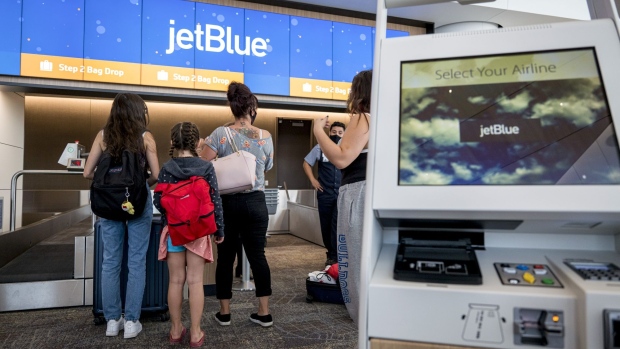Sep 28, 2022
JetBlue’s Pursuit of Airport Slots Irked Rivals, Southwest Says
, Bloomberg News

(Bloomberg) -- JetBlue Airways Corp. decided to partner with American Airlines Group Inc. because of the legacy airline’s access at congested airports in New York, JetBlue Chief Executive Officer Robin Hayes told a Boston court Wednesday.
The alliance, which is being challenged by the Justice Department in federal court in Massachusetts, rankled rival Southwest Airlines Co., which had unsuccessfully sought to increase its own access in New York.
“We cannot match” the scheduling relevance the JetBlue-American alliance gives each arline, Southwest’s chief commercial officer, Andrew Watterson, told US District Judge Leo Sorokin during the trial.
Federal aviation regulators limit traffic at New York City-area airports including John F. Kennedy, LaGuardia and Newark, awarding certain departure and arrival times, known as slots, to airlines. There are only so many slots at each airport, and they are constantly in demand.
JetBlue flies out of all three airports, but it was unable to persuade rivals to lease it more slots as it tried to grow, Hayes, the JetBlue CEO, said.
“The No. 1 hindrance to growth was the lack of slots. We had tried for years to get slots. We tried to get them through regulatory processes. We tried bidding for them,” Hayes said. “The airlines that have them don’t want to let them go.”
JetBlue was able to use American’s slots, and vice versa, through a partnership known as the Northeast Alliance, which allows them to share passengers, routes and other in-demand resources at airports in the US Northeast. The Justice Department alleges that it gives the two companies outsized control in flights in and out of the New York area.
Last year, the DOJ, along with attorneys general from six states and the District of Columbia, sued American and JetBlue over their partnership. In his testimony on Wednesday, Hayes called the partnership a “generational opportunity,” and said it allowed JetBlue to compete with larger rivals like Delta Air Lines Inc. in New York by using American’s slots.
Watterson, the Southwest chief commercial officer, said JetBlue shouldn’t be allowed to keep slots it obtained from American during earlier government regulatory interventions. Watterson, testifying as part of the DOJ’s case on Wednesday, said JetBlue won those slots because of its status as a low-cost carrier, and the alliance puts them back in American’s control.
In a January 2021 agreement with the Department of Transportation, American and JetBlue agreed to divest some slots at Kennedy and Ronald Reagan Washington National airports.
The alliance between American and JetBlue hasn’t increased the number of flights out of these airports, Watterson said, leaving smaller airlines like Southwest at a disadvantage. These slots are “zero sum,” he said.
“Any addition has to be counterbalanced with a subtraction,” he said. “That slot would have had to come from somewhere.”
More slots means American and JetBlue have better schedules and can fly more flights in the Northeast, Watterson said. “In the slot controlled airports, we cannot match their schedule relevance.”
Pandemic Growth
John Davis, a Justice Department attorney, pressed Hayes on a June 2020 presentation Hayes gave to lenders to raise money during the pandemic. The slides described JetBlue as “New York’s hometown airline with strong market positions in the largest and most capacity constrained US markets.” It also boasted that Jetblue had “irreplaceable assets at JFK” as the second-largest slot holder with leases through 2042. The presentation described JetBlue as the second-largest carrier in the New York market with a 35% share, while Delta and American had only 16% each.
Hayes said JetBlue was only second-largest when looking just at domestic flights out of Kennedy and LaGuardia. If Newark is included, JetBlue would be third, he said.
“We were a distant third in NYC and we wanted to bring more choice,” Hayes says.
JetBlue had the largest share of US passengers out of Kennedy Airport in the 12 months ending June 2022, according to a Department of Transportation report. It had the No. 2 largest share for passengers out of Newark, and was No. 4 for flights out of LaGuardia, according to the report.
The case is US v American Airlines, 21-cv-11558, District of Massachusetts (Boston).
©2022 Bloomberg L.P.


